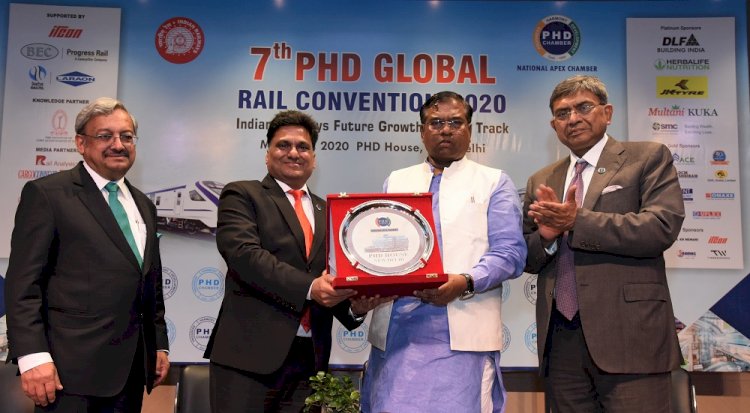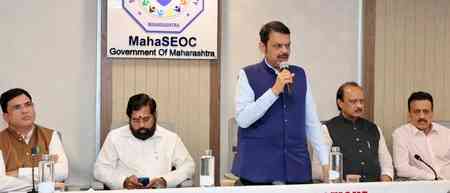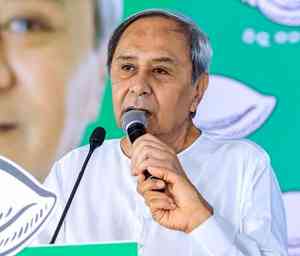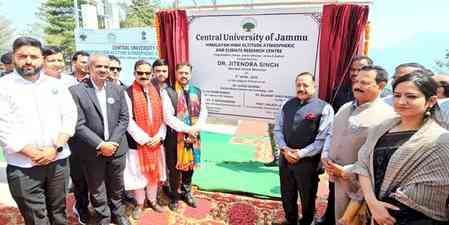Indian Railways second largest transportation network in world: Faggan Singh Kulaste
Addressed delegates at 7th PHD Global Rail Convention-2020

New Delhi: Addressing the Delegates at the 7th PHD Global Rail Convention-2020; Indian Railways Future Growth on Fast Track held at PHD House, New Delhi, the Chief Guest Shri Faggan Singh Kulaste, Minister of State, Ministry of Steel, Government of India deliberated the delegation on the pivotal role played by Indian Railways in enhancing the trade and economic growth of the country.
Shri Kulaste stated that the Indian Railways today is the second largest transportation network in the world and the sector is still progressing towards further growth and development.
ISPAT is one of the most important raw material for sectors like Infrastructure Automobile, Shipping, Roadways and Railways among other. With the increasing transformation of Indian Railways the growth, development and improved quality of production of ISPAT is of integral importance fulfill the growing needs of railways, said Shri Faggan Singh Kulaste.
The Minister-Shri Kulaste urged PHD Chamber to organize more of such conferences and to provide valuable suggestions, from its member industry stakeholders, to the Ministry for the enhancing the growth and development of the Steel sector.
Dr D K Aggarwal, President PHD Chamber of Commerce and Industry, welcomed the delegates at the 7th PHD Global Rail Convention-2020 and appreciated the Indian Railways for undertaking developmental initiatives and aiming to provide world-class train journey experience to passengers by embracing technology and modernization advancements.
The budgetary visionary objective of transforming Indian railway ecosystem and development of 5 new railway stations should be proposed through public private partnership model to meet the resource crunch, said Dr Aggarwal
We appreciate the government for the recent initiative of 100% electrification of the entire Indian Railways, which is about 125,000 km of track length and nearly 68,000 km of route length, by 2024 become a net-zero emission network by 2030, said Dr D K Aggarwal.
Mr Vinod Kumar Yadav, (IRSEE), Chairman, Railway Board, Ministry of Railways congratulated and appreciated the extensive work done by PHD Chamber for initiating suggestions for the growth and development in the India Railway ecosystem. He reiterated that modernization gives an integrated approach for enhancing capacity of India railway ecosystem through multi tracking railway connectivity across the country.
It is a moment of pride as today the Indian Railways is being recognized by one and all. Indian railways has capacity constraints not demand constraints, said Mr Yadav.
Mr Yadav further highlighted the reworking of restructuring the Indian railway on freight loading, safety mechanism, digital transformation, upgradation of railway networks, stations and Infrastructure redevelopment of rail ecosystem. Indian railways has ramped up to electrical locomotives from diesel locomotives, he added.
Stressing upon the roadmap for development of railway ecosystem Mr Yadav stated that in order to achieve the target, prioritizing projects is the major key element to be fulfilled by year 2022-23.
Mr Katsuo Matsumoto, Chief Representative of Japan International Cooperation Agency (JICA) India Office thanked and appreciated PHD Chamber of Commerce and Industry for providing the opportunity. He cherished the Indian railway as an attractive destination for foreigners. He stressed upon the economic cooperation of the transport sector showing an upright graph at the visit of Indian Prime Minister Mr. Narendra Modi in 2014.He concluded by stating Railway Sector as the key sector to improve and flourish for growth and development of the country.
Mr. Sanjay Aggarwal, Sr. Vice President, PHDCCI while concluding the inaugural session presented the vote of thanks and highlighted about the optimum and progressive vision of momentous transformation in the rail ecosystem.
Citing about the shining example of India and Japan long lasting friendship, Mr Sanjay Aggarwal stated the importance of technology to reduce the travel time and cost in the rail services.
Mr. Veenu Jain, Chairman, PHD Railways Committee appraised the support for holding the 7th PHD GLOBAL RAIL CONVENTION-2020. He highlighted railways as the fundamental player of socio-economic development to transform the trade and tourism of our country.
Dr Ranjeet Mehta, Principal Director, PHDCCI, while moderating the session apprised the distinguished guests and participants about the proactive role the Indian Railways is playing in development of the Indian Infrastructure. The conference was attended by more than 200 delegates.


 cityairnews
cityairnews 








